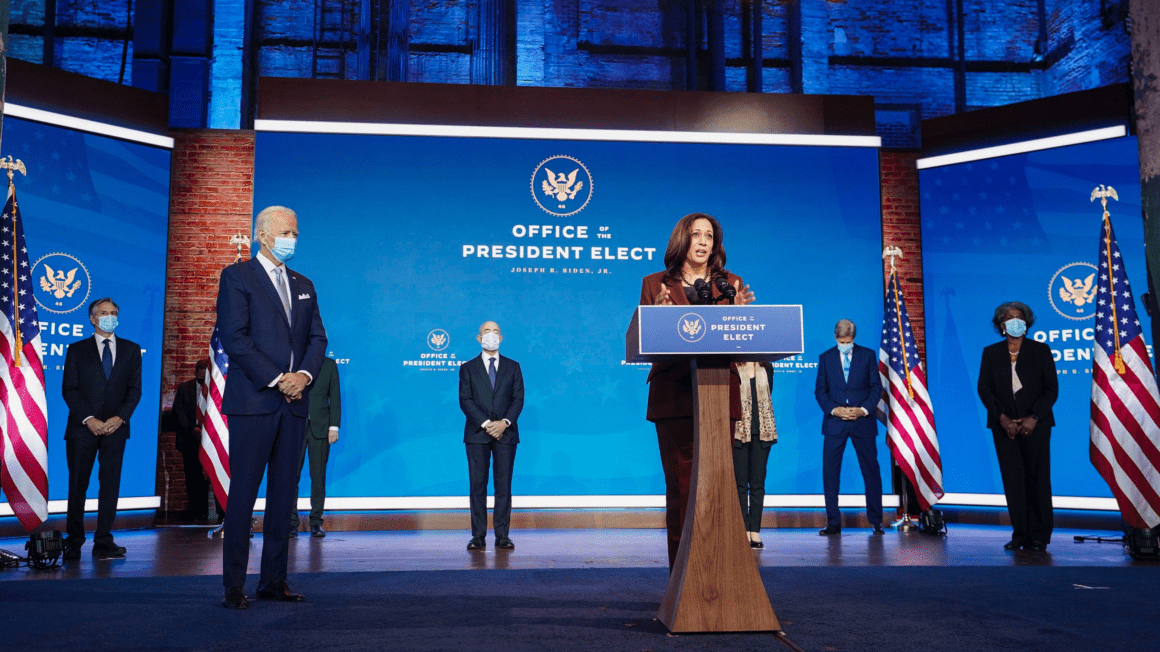The first documented Filipinos arrived in what would become California in 1587; the first Indian slaves came and helped build Jamestown in 1635, and Chinese labor connected America’s coasts with the First Transcontinental Railroad in 1869. Faced with discrimination, forced relocation, and unlawful incarceration, Asian American and Pacific Islanders (AAPIs) persevered in the cause for greater representation, with the first AAPI elected to Congress in 1957.
Now, another 64 years later, and over four centuries after the first Filipino sailor set foot on American shores, Kamala Harris will be inaugurated as the first AAPI vice president of the United States of America on January 20th.
The Biden-Harris ticket would not have won without the support of the AAPI community, organizers across the country say. For people like Madalene Mielke, president of the nonpartisan Asian Pacific American Institute for Congressional Studies (APAICS), achieving this milestone has been years in the making.
“We build and invest in the AAPI community every year, not just months before the election,” Mielke said, addressing her organization’s mission to increase AAPI representation and participation. “It’s about including people who aren’t usually involved in office… And this year, AAPIs overperformed in each state compared to 2016.”
According to Mielke, over 300 AAPIs ran for office this year–up from 220 in 2018. “Not only that, we need to also look at staff diversity in local offices… This race was so close, Biden could not have won without the Asian American vote,” Mielke said.
However, many organizers believe that the role of the AAPI community in Biden’s victory has been underappreciated. Nationwide, AAPIs are the fastest growing racial group, and one-third live in the 10 most competitive states.
Yet still “people don’t know who Asian American voters are,” says Yi Chen, director of the documentary First Vote, which explored AAPI civic engagement in the 2018 midterms. She explained that in 2016, AAPIs consistently had low voter turnout due to language barriers and lack of outreach.
Flipping through the various networks on election night, Chen noted how none talked about the AAPI community. “We feel invisible… It’s why I make documentaries: to make the case for Asian American voters. To show people why we’re important.”
Thu Nguyen, national director of OCA-Asian Pacific American Advocates, says unifying AAPIs isn’t easy, either. Asian Americans have roots in over 20 nations, and speak as many languages. Some families have been here for generations, and others have just immigrated.
“It’s very difficult as an organization to find stances that everyone can agree on,” Nguyen said. “After we passed a resolution supporting affirmative action, our Central Virginia chapter stopped talking with our national branch.”
Despite the challenges of representing such a diverse group, OCA’s Greater Houston chapter rallied AAPIs in Texas and canvassed over 800,000 households in Harris County alone, where turnout has shattered previous records. “Much can be credited to the get-out-to-vote work of Asian American and Latino organizations,” Nguyen said, “and Houston has become a model for building a cohesive AAPI community.”
Texas, once a solid Republican state, has become “a sleepy purple,” says Razi Asaduddin, president of the Asian American Democrats of Texas. “In some districts we boosted Asian American turnout from 18% to 42% this year… With some more engagement, 2022 will look really good.”
Asaduddin’s own organization made 300,000 phone calls and sent 225,000 handwritten postcards to remind AAPIs to vote. Over the summer, they held hundreds of events over Zoom, including up to 25 phone banking sessions per week.
However, Asaduddin found that having young people talk with their family was by far the most effective way to increase turnout. “A lot of people don’t turn out because no one reaches out to them–but then, no one reaches out to them because they don’t turn out. It’s a chicken and egg situation… But if it’s someone they know, they’re more likely to listen. If younger generations talk to their parents, they’ll slowly change the conversation.”
Reflecting on the pivotal role of AAPIs this election, many organizers used the same phrase: AAPIs have gone from being “marginalized to the margin of victory.” Nowhere was this more apparent than in Wisconsin, a swing state with over 30,000 unregistered AAPIs as of October 2020. In Wisconsin, which allows same-day voter registration, Biden prevailed over Trump by a margin of 20,000 votes.
“AAPIs are a big enough voting bloc to swing every state election,” says Angelito Tenorio, co-chair of Wisconsin AAPIs for Biden. “Democrats have started to realize the importance of AAPIs… and if we didn’t show up, Biden would not have won.” A number of exit polls and surveys confirm this: nearly 70% of Asian Americans voted for Biden–higher than any other racial group except African Americans.
Tenorio, who is also alderman of West Allis, Wisconsin, said that overall, “AAPIs just don’t see themselves as politicians. Growing up, we learned from our parents about the importance of giving back–but not at the ballot box or in elected office.”
Tenorio said this was why he built up Wisconsin’s AAPI outreach infrastructure along with co-chair May yer Thao and outreach director Jessica Boling. “We started from scratch… Now, AAPIs in Wisconsin are realizing how much power they have. We cannot be overlooked anymore. The future of Wisconsin is AAPI.”
With a grin, Tenorio told me that things won’t end with the Biden victory. “We must keep building, not lose momentum, and further inclusivity… There is a bamboo ceiling that we need to break.”









